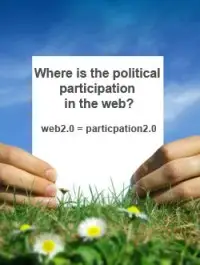E-democracy: participation next? (1)
 The concept of e-democracy dates from the early days of Internet. To my understanding, it embraces everything that connects political processes and the web. Back in the 90s high promises were linked to the web and its implications for democracy and participation. One early example is the Electronic Town Hall, but nowadays e-democracy stands for many approaches such as e-activism, e-politics, e-participation or latest government2.0.
The concept of e-democracy dates from the early days of Internet. To my understanding, it embraces everything that connects political processes and the web. Back in the 90s high promises were linked to the web and its implications for democracy and participation. One early example is the Electronic Town Hall, but nowadays e-democracy stands for many approaches such as e-activism, e-politics, e-participation or latest government2.0.
**While the early beginnings were optimistic, they had often not fulfilled promises. **Such is the example of new venues to engage digital citizens to participate directly through e-voting. Another example was e-government, which encompasses different layers such as networking government institutions, and makes or offers more direct services to citizens. On the contrary, civil society such as NGOs or social movements embrace the potential of web for their activism earlier, quicker and deeper. Already back in 1999, the Seattle protests were effectively organized over the web.
There are many reasons why especially governments respond slowly to the potentials of the web, and why civil society uses the web strategically. But both sides have not really used the potential of the web to enhance participation. From my point of view two difficulties arise: (1) Government institutions and most NGOs are not yet willing to open themselves for an authentic two-way conversation. (2) Information is still in many cases not transparent and citizens are not being offered to participate.
Developments during the last year show some interesting new approaches to enhance participation. Tara Hunt calls it feedback2.0 (listen and learn) in her interesting government2.0 presentation. She says in her presentation:
"We need to change the way we approach service, viewing the public not as a recipient, but as more of a partner."
One great example of enhancing more participation in political processes has been realized in Kenya. Mzalendo is a website, " which is a volunteer run project whose mission is to keep an eye on the Kenyan Parliament.” One of the initiator is Ory Okolloh, who has been interviewed by BBC. The website offers valuable information on decision making processes in the Kenyan parliament and opens new ways of participation for active citizens. I have not yet discovered such a promising "watchdog" website in Europe, meaning how Germany lags behind.